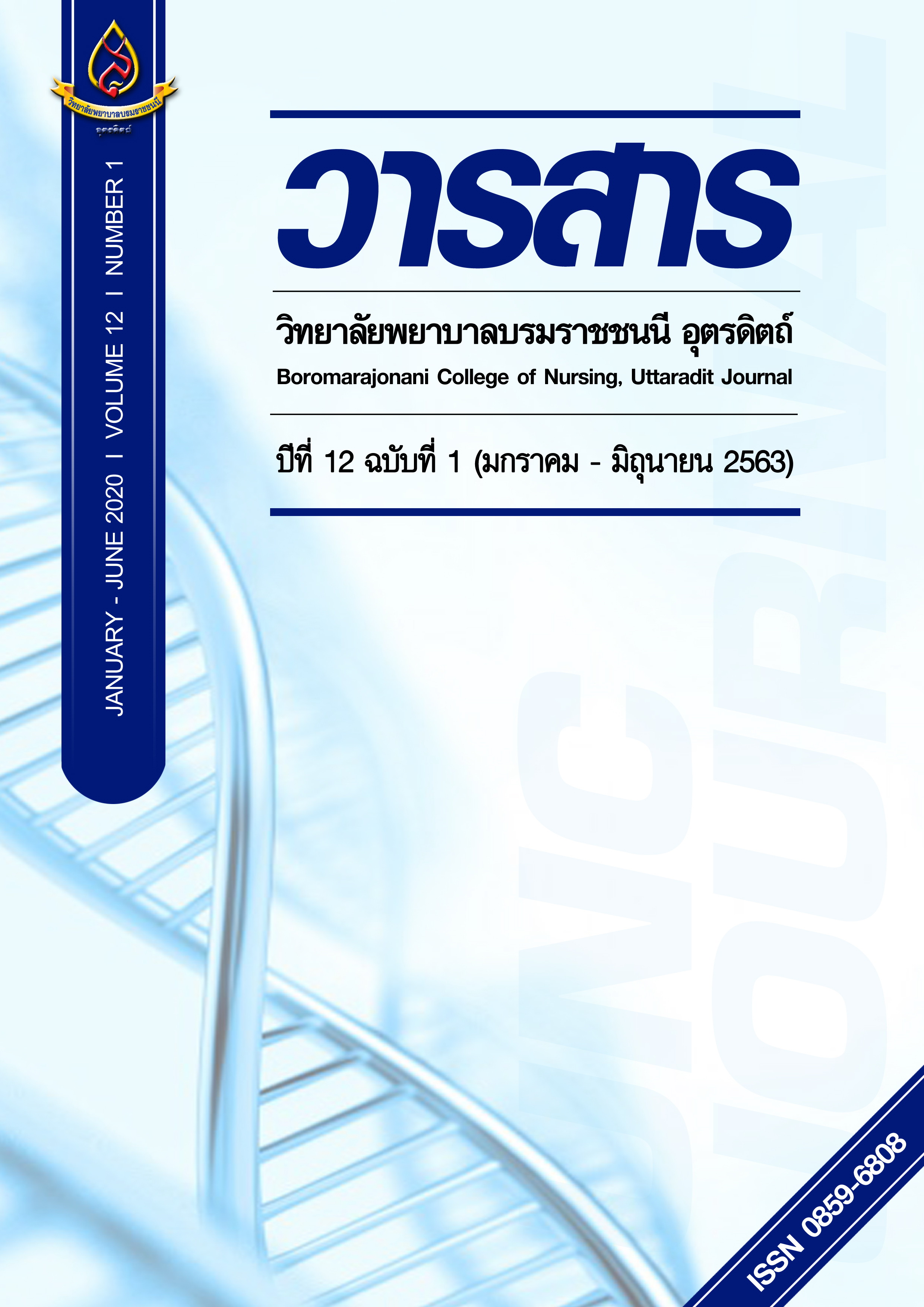ผลของการใช้การเรียนการสอนตามแนวคิดการฝึกหัดทางปัญญาต่อความสามารถในการใช้กระบวนการพยาบาลของนักศึกษาพยาบาล
Main Article Content
บทคัดย่อ
การจัดการเรียนการสอนโดยใช้แนวคิดการฝึกหัดทางปัญญามีความสำคัญต่อการส่งเสริมให้ผู้เรียนมีความสามารถในการใช้กระบวนการพยาบาล การวิจัยกึ่งทดลองครั้งนี้มีวัตถุประสงค์เพื่อศึกษาผลการใช้การเรียนการสอนตามแนวคิดการฝึกหัดทางปัญญาต่อความสามารถในการใช้กระบวนการพยาบาลและเพื่อเปรียบเทียบความสามารถในการใช้กระบวนการพยาบาลของนักศึกษาพยาบาลกับเกณฑ์ร้อยละ 60 กลุ่มตัวอย่างเป็นนักศึกษาพยาบาลชั้นปีที่ 2 จำนวน 60 คน วิทยาลัยพยาบาลบรมราชชนนี อุตรดิตถ์ เครื่องมือที่ใช้เป็นแบบทดสอบความสามารถในการใช้กระบวนการพยาบาลสำหรับนักศึกษาพยาบาล วิเคราะห์ข้อมูลโดยใช้สถิติพรรณนาและสถิติทดสอบที ผลการศึกษาพบว่า
1) ความสามารถในการใช้กระบวนการพยาบาลโดยรวมหลังเรียน ร้อยละ 81.67 ของนักศึกษาพยาบาลศาสตร์ชั้นปีที่ 2 สอบผ่านเกณฑ์ โดยมีคะแนนเฉลี่ยเท่ากับ 35.64 คะแนน ส่วนเบี่ยงเบนมาตรฐาน 5.77 หรือคิดเป็นร้อยละ 68.54
2) เปรียบเทียบระหว่างเกณฑ์กับคะแนนความสามารถในการใช้กระบวนการพยาบาลหลังเรียนของนักศึกษา พบว่า คะแนนหลังเรียนของนักศึกษาสูงกว่าเกณฑ์ร้อยละ 60 อย่างมีนัยสำคัญทางสถิติที่ระดับ.05
การศึกษาครั้งนี้ผู้สอนสามารถนำการเรียนการสอนโดยใช้แนวคิดการฝึกหัดทางปัญญาไปใช้ในการพัฒนานักศึกษาพยาบาลให้สามารถสร้างความรู้โดยเฉพาะการใช้กระบวนการพยาบาลเพื่อแก้ปัญหาผู้ป่วย
Article Details
บทความหรือข้อคิดเห็นใดใดที่ปรากฏในวารสารวิจัยการพยาบาลและวิทยาศาสตร์สุขภาพ เป็นวรรณกรรมของผู้เขียน ซึ่งบรรณาธิการหรือสมาคมศิษย์เก่า ไม่จำเป็นต้องเห็นด้วย และบทความที่ได้รับการตีพิมพ์เผยแพร่ถือเป็นลิขสิทธิ์ของวารสารวิจัยการพยาบาลและวิทยาศาสตร์สุขภาพ
เอกสารอ้างอิง
Ambrose, S.A., Lovett, M., Bridges, M.W., DiPietro, M. & Norman, M.K. (2010). How learning works: seven research-based principles for smart teaching. San Francisco: John Wiley & Sons.
Chidnayee, S. (2016). The development of an instructional model based on cognitive apprenticeships to enhance critical thinking in nursing process abilities for nursing students. Doctoral dissertation Naresuan University, Phitsanuloke. (in Thai)
Chidnayee, S. (2017). Cognitive Apprenticeship: Instructional Model to construct knowledge. Boromarajjonnani College of Nursing Uttaradit Journal, 9(2), 128-139. (in Thai)
Chidnayee, S. & Kaewurai, W. (2018). The development of an instructional model based on cognitive apprenticeships to enhance critical thinking in nursing process abilities for nursing students. Journal of Education Naresuan University, 20(4), 191-205. (in Thai)
Collins, A., Brown, J. S., & Holum, A. (1991). Cognitive apprenticeship: Making thinking visible.American Educator, 15(3), 1-18.
Collins, A., Hawkins, J., & Carver, S. M. (1991). A cognitive apprenticeship for disadvantaged students. In B. Means, C. Chelemer, & M. S. Knapp (Eds.), Teaching advanced skills to at-risk students (216-243). San Francisco: Jossey-Bass.
de Bruin, L. R. (2019). The use of cognitive apprenticeship in the learning and teaching of improvisation: Teacher and student perspectives. Research Studies in Music Education. https://doi.org/10.1177/1321103X18773110
Gilley, A., Gilley, J. W., & Kouider, E. (2010). Characteristics of managerial coaching. Performance Improvement Quarterly, 23(1), 53-70.
Hayes, K.V.D. (2017). Chapter 11 critical thinking and the nursing process: Foundations for practice. In R.F. Craven, C.J. Hirnle & C.M. Henshaw (Eds.), Fundamentals of nursing: Human health and function (8th ed.) (189-201). Wolters Kluwer.
Jack, K., Hamshire, C.,& Chambers, A. (2017).The influence of role models in undergraduate nurse education. Journal of Clinical Nursing, 26(23-24), 4707-4715.
Lofthouse, R., David, L., & Carl, T. (2010). Coaching for teaching and learning: a practical guide for schools. National College for Leadership of Schools and Children's services, Reading: CfBT Education Trust.
Ministry of Education. (2017). Ministry of education announcement: Thai qualifications framework for Higher Education Bachelor of Science in Nursing B.E. 2560, 2-3. (in Thai)
Müller-Staub, M., Abt, J., Brenner, A., & Hofer, B. (2015). Expert report on the responsibility of nursing. Swiss Nursing Science Association.
Puticab, K. & Trivic, D.D. (2016). Cognitive apprenticeship as a vehicle for enhancing the understanding and functionalization of organic chemistry knowledge. Chemistry Education Research and Practice, 17, 172-196.
Rueangkitchanan,A. (2017). Development of an instructional model by integrating cognitive apprenticeship approach and process writing approach for enhancing expository writing ability and reflective thinking ability of undergraduate students. Journal of Education Research, Faculty of Education, Srinakharinwirot University, 11(2), 232-254. (in Thai)
Salisu, A. & Ransom, E.N.(2014). The role of modeling towards impacting quality education. International Letters of Social and Humanistic Sciences, 32, 54-61.
Spector, J. M. (2016). Foundations of educational technology: integrative approaches and interdisciplinary perspectives. New York: Routledge.
Shunk, D.H.(2012). Learning theories: An educational perspective (6th ed.).Boston: Pearson Education.
Vitoonmetha, M., Niputhuttapong, S, Iemsam-Ang,M., & Tejangkura, L. (2016). Development of a guideline to
enhance nursing students’ abilities in utilizing nursing process. Thai Journal of Cardio-Thoracic Nursing, 27(2), 100-113. (in Thai)


